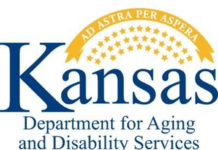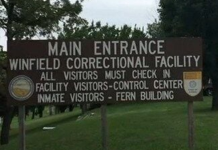(Updated with more comment from KHP, details from the proposed injunction and edits throughout)
A federal judge on Friday found that a technique known as the “Kansas two step” used by the Highway Patrol to detain drivers and sniff out drugs violated the constitutional rights of motorists.
U.S. District Judge Kathryn Vratil found that former KHP Superintendent Herman Jones was responsible for a practice that unlawfully stopped drivers in Kansas – especially out-of-state motorists – without reasonable suspicion or consent.
Vratil ruled that the practice violated drivers’ rights to be free from unconstitutional searches under the Fourth Amendment of the Constitution.
“The KHP has developed a work-around, however, which exploits fundamental precepts of the American legal system, along with the ignorance and timidity of the motoring public,” Vratil wrote in her opinion.
The lawsuit brought by the American Civil Liberties Union of Kansas representing three drivers and two passengers focused on a practice described as the “Kansas two step.”
The ACLU said the KHP would use the strategy to break off an initial traffic stop and attempt to reengage the driver in what would then be considered a consensual encounter.
After issuing a ticket or warning and telling the driver to have a safe trip, the trooper would turn their body, take two steps toward the patrol car but return to the driver’s window to ask the driver to answer a few more questions.
“The court endeavors to strike the appropriate balance and finds that the KHP does not routinely require or ensure that troopers follow the law with regard to reasonable suspicion and consent, and it has developed a practice of detaining motorists under circumstances which the Fourth Amendment forbids,” Vratil wrote.

“Stated otherwise, the KHP has not satisfied its burden of proving that its policies and practices satisfy the Fourth Amendment; troopers unlawfully detain motorists based on factors which do not satisfy the low bar of reasonable suspicion,” she ruled.
“The KHP has not shown that such motorists give constitutionally valid consent to the prolonged periods of detention which they confront. Such policies and practices must be condemned as unlawful,” she wrote.
She said the Highway Patrol engaged in a pattern or practice of “prolonging traffic stops by using the ‘Kansas two-step’ to coerce drivers into answering questions when the troopers do not have reasonable suspicion and the drivers do not feel free to leave.
“This practice violates the Fourth Amendment by extending traffic stops without reasonable
suspicion and without the knowing, intelligent and voluntary consent of the drivers.”
Sharon Brett, the legal director for the ACLU of Kansas, called the decision a “huge win” for their clients and “for anyone else who travels on Kansas highway.”
“Today’s decision validates that motorists’ constitutional rights cannot be cast aside under the guise of a ‘war on drugs,'” Brett said in a statement.
“It also demonstrates that courts will not tolerate the cowboy mentality of policing that subjects our citizens to conditions of humiliation, degradation, and, in some tragic cases, violence,” she said.
The Highway Patrol issued a statement on Saturday responding to the ruling.
“We are carefully reviewing the Court’s decision and respect the judge’s conclusions and recommendations,” said Col. Erik Smith, who last week received tentative approval from a Senate committee to serve as the new KHP superintendent.
“Moving forward, KHP will continue its endeavor to ensure that our enforcement operations respect constitutional rights and comply with the law as we carry out our mission of service, courtesy, and protection,” Smith said.
The judge criticized the Highway Patrol for waging a “war” on motorists traveling on Interstate 70 through Kansas between Colorado and Missouri, two states where marijuana is now legal.
“As wars go, this one is relatively easy; it’s simple and cheap, and for motorists, it’s not a fair fight,” Vratil wrote.
“The war is basically a question of numbers: stop enough cars and you’re bound to discover drugs. And what’s the harm if a few constitutional rights are trampled along the way?” Vratil wrote in her 79-page opinion.
The plaintiffs prevailed on a ruling of law and the right to an injunction, the terms of which have not yet been formally entered.
Vratil has given both sides in the case no later than Aug. 7 to show why an injunction should not be issued under certain terms spelled out by the judge. They would have until Aug. 14 to respond further.
Among other things, the proposed injunction spelled out by Vratil would require any trooper seeking consent for a search, to affirmatively inform the subject of their right to refuse the search and to revoke consent at any time.
The consent would need to be documented on a form explaining their rights. The
written form shall include separate signature lines for the trooper to certify that the trooper has read and explained the rights to the subject.
The proposed injunction would require any trooper who seeks to reengage with a driver or occupant of the vehicle, after a traffic stop has concluded to inform the subject their right to refuse and to revoke consent at any time.
The proposed injunction, which could last four years, also would require KHP to provide all officers with at least 24 hours of training in making legal stops by no later than Sept. 1, 2024. Troopers then must undergo 10 hours of training each year going forward.
The Highway Patrol, under the injunction, would be required to maintain and operate audio recording and video cameras in all marked and unmarked vehicles that are assigned to routine patrol duties and shall promptly repair or replace any nonfunctioning equipment.
The ACLU’s lawsuit said the Highway Patrol had designated Interstate 70 as a “drug corridor” and trained its officers to watch for motorists traveling to and from Colorado because the state legalized marijuana.
The lawsuit noted that motorists with out-of-state plates made up 93% of the Highway Patrol’s stops in 2017. And 96% of the agency’s civil forfeitures in 2019 came from out-of-state drivers stopped on I-70.
Further, two-thirds of those motorists were either drivers of color or had passengers of color in their vehicle, the lawsuit said.
The case at hand focused on three traffic stops. All of the drivers had an out-of-state plate and the plaintiff was driving to or from Colorado and had committed a traffic infraction when they were pulled over.
After writing a ticket, the trooper further detained plaintiff for a canine sniff of the vehicle without discovering drugs or anything else illegal.
In one stop, the trooper performed the “Kansas two-step” by saying goodbye to a plaintiff after issuing the ticket or warning, taking a few steps away from the vehicle and immediately spinning around and returning to the vehicle.
The trooper asked the plaintiff if they could ask a few more questions, and seeking more information about plaintiff’s travel plans and whether plaintiff had drugs in the vehicle and whether the plaintiff would consent to a search.
Responding to a 2016 survey from former Attorney General Derek Schmidt to assess the impact of the legalization of marijuana in Colorado, the KHP suspected that 69% of all marijuana seized in 2015 came from Colorado.
“As a result of Colorado’s decision to legalize marijuana, KHP increased scrutiny of drivers traveling to and from Colorado,” the ACLU said in its original lawsuit.
















